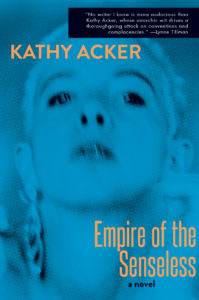
In her Paris Review essay on Kathy Acker’s Empire of the Senseless—an “obscene and mind-bending saga”, reissued last month for the twenty-fifth anniversary of its publication—You Too Can Have a Body Like Mine author Alexandra Kleeman praises Acker as “a muckraker in the original sense, one who dredges up the dirt and puts it on display to the delight and horror of the reading public.” Over at the New York Times, Dwight Garner says of Native American author Tommy Orange’s debut novel, There There, “[it] has so much jangling energy and brings so much news from a distinct corner of American life that it’s a revelation in a way that’s reminiscent of the best of [Sherman] Alexie’s early work.” Josephine Livingstone considers Seymour Hersh as an incomplete hero from a lost world in her New Republic review of Hersh’s memoir, Reporter. We also spotlight Rob Spillman’s Guernica take on Akwaeke Emezi’s dazzling debut, Freshwater, as well as Hannah Black’s 4Columns review of Caryl Phillips’ A View From the Empire at Sunset—a fictionalized account of Jean Rhys’ early life.
*

“’I make nothing new, create nothing: I’m a sort of mad journalist,’ Kathy Acker writes in 1989, on Empire of the Senseless…At first glance, journalism seems an odd analogy for this work, an obscene and mind-bending saga set in the shadow of Reagan’s presidency and told from the alternating perspectives of Thivai, a pirate, and his intermittent lover, a half-human, half-robot woman named Abhor. But even as the novel extends into a speculative near future—where Paris has been overrun by Algerian rebels and the CIA conducts clandestine operations to turn this chaos to their strategic advantage—it remains insolently rooted in the world in which we belong, anchored by Acker’s stubborn commitment to rendering visible the sexist, racist, capitalistic, father-fucking societal ego of her time—and of our own. Kathy Acker is a muckraker in the original sense, one who dredges up the dirt and puts it on display to the delight and horror of the reading public … Terms like postapocalyptic and dystopian are too tidy for Acker’s project, which aims to draw attention to the squalor of the civilized and the unfinished, ongoing process of world death. Instead of seeing ends, we see horizons, swaths of world that shade off into the distance and finish somewhere out of view. Acker uses the scaffolding of the science-fiction novel in the same way a looter might use a rock to bash in the window of a supermarket—a convenient tool to access someplace interesting. “
–Alexandra Kleeman on Kathy Acker’s Empire of the Senseless (The Paris Review)
*
“Like Rhys’s Caribbean intervention into Brontë’s English drama, A View of the Empire at Sunset is an act of homage as well as critique. Phillips, always a measured and careful writer, here mimics Rhys’s precise itemizations of the deprivations and humiliations of everyday life. His Rhys seems to have lost some of the wit and fury of the Rhys we know from her own novels, perhaps because it is hard for even a highly skilled pastiche to replicate the subtleties of a brilliant original, perhaps because Phillips wanted to give us a Rhys with the veil of her talent stripped away, a Rhys who exists at exactly the minute and trivial scale of middle-class English life—and most likely both … to Phillips, Rhys is the scion of a class of overseers, distinguished only by the aberration of her talent and insight. He borrows her own technique of cold precision and uses it against her, a complicated act of love … The feeling of homelessness experienced by Phillips’s meticulously imagined Rhys obliquely echoes the epidemic of loss that imperial ambition let loose upon the world.”
–Hannah Black on Caryl Phillips’ A View From the Empire at Sunset (4Columns)
*
“There There has so much jangling energy and brings so much news from a distinct corner of American life that it’s a revelation in a way that’s reminiscent of the best of Alexie’s early work. In terms of sheer brio and promise, its appearance marks the passing of a generational baton … The story Orange tells moves cinematically in its second half, sweeping up all that came before. To film it properly would require a Robert Altman, a director with an unorthodox sense of spectacle. It might also require a director willing to tinker with Orange’s expedient Grand Guignol ending, one less willing to simply burn the set down … It’s the close-up work that puts this novel across, however, the quotidian details of blasted lives. That Orange manages to link these details to a historical sense of outrage at how America has treated its native people, in a manner that approaches scarifying essay without dropping over the fence into lecture or sociology, adds to this novel’s smoke … Orange is especially interested in what cultural inheritance means, in how to carry your roots like a conscience, in what one needs to leave behind and what one needs to take … There There has its soft spots. At times it veers toward the sentimental; it can lean too heavily on its themes. There are perhaps too many resonant generalities about the importance of storytelling. But the real stuff is here, a sense of life as it is lived, an awareness of the worm inside each bottle of mezcal.”
–Dwight Garner on Tommy Orange’s There There (The New York Times)
*
“The experience of reading Hersh’s memoir is like visiting a lost world … It’s all reporting—dense and detailed reporting on reporting. That iterative and pointillist style of telling a story does fall into a genre: noir…To put it in a callow way, this stuff is cool. It’s also very masculine. Almost every person in Hersh’s memoir is a man—a sign of the time and the industry … Dwight Garner of The New York Times faults Reporter for lacking detail and color about human beings who are not Sy Hersh. It’s true: This is not a psychological or social portrait of any of the major players who ran newspapers during the decades covered in the book. And the Nixon anecdote reveals that what is left out of Reporter, namely women and a political consciousness that includes women, speaks a little loudly for comfort. Hersh is not a political theorist, nor a literary memoirist, nor a paragon of journalistic behavior. He’s a reporter. Looking back over his career from today’s vantage point, he is something of an incomplete hero. It’s easy to mourn the loss of this industry’s old form, and to lionize Hersh as its most ferocious remnant. The past is a foreign country, and, for better or worse, they did journalism differently there.”
–Josephine Livingstone on Seymour Hersh’s Reporter (The New Republic)
*
“To enter Emezi’s world, you not only need to decolonize your mind, but also free yourself from patriarchal and binary ways of viewing the world … The great trick of this novel is that we want not only peace for Ada, but also for the troubled spirits inhabiting, and one with, her. Reading Emezi’s unfolding integration of fictional forms and modes of thinking—spiritual, analytical, historical, cultural, clinical—you feel like you are witnessing a talented and emotionally astute writer finding her voice(s). Freshwater is a dazzling, problematic debut that promises so much more.”
-Rob Spillman on Akwaeke Emezi’s Freshwater (Guernica)
If you buy books linked on our site, Lit Hub may earn a commission from Bookshop.org, whose fees support independent bookstores.

